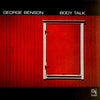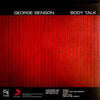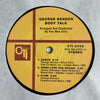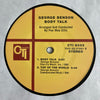











George Benson – Body Talk
Rarity - Sealed
Guitar – Earl Klugh, George Benson
Bass – Gary King, Ron Carter
Drums – Jack DeJohnette
Electric Piano – Harold Mabern
Percussion – Mobutu
Tenor Saxophone – Frank Foster
Trombone – Dick Griffin, Gerard Chamberlain
Trumpet, Flugelhorn – John Gatchell, Jon Faddis, Waymon Reed
Arranged and conducted by Pee Wee Ellis
Written George Benson (A1, A3, B1-2), Alfred Ellis (A1), Donny Hathaway (A2), Gene McDaniel (A2)
1LP, Gatefold jacket
Original analog Master tape : YES
Heavy Press : 180g Virgin Vinyl
Record color : Black
Speed : 33 RPM
Size : 12'’
Stereo
Studio
Record Press : Pallas
Label : Speakers Corner
Original Label : CTI
Recorded on July 17–18, 1973 at Studio Van Gelder Studio, Englewood Cliffs, New Jersey
Engineered by Rudy Van Gelder
Produced by Creed Taylor
Lacquer cut by Maarten De Boer at Emil Berliner Studios
Originally released in August 1973
Reissued in 2014
Tracks :
Side A:
1. Dance
2. When Love Has Grown
3. Plum
Side B:
1. Body Talk
2. Top of the World
Reviews :
"With an eye and ear on what was happening on the soul charts -- James Brown in particular -- Benson made a decided swerve toward R&B on this release. Indeed the JB's Pee Wee Ellis turns up as a big band arranger on three tracks, and he no doubt had a direct influence on the distinct JB groove of one of the non-big-band tunes, "Dance." It should come as no surprise by now that this formidable guitarist has no problem handling any kind of groove, although the mixed rhythm section of Jack DeJohnette, Ron Carter, electric pianist Harold Mabern, and percussionist Mobutu sometimes sends mixed messages. Earl Klugh has a few tasty moments on his own, and there are some reconnaissance flights back to the jazz side of George, which he handles with his usual confident aplomb." AllMusic review by Richard S. Ginell
"With a title like Body Talk, and a lead-off track called "Dance," George Benson—a guitar-god-on-the-rise when this album originally hit shelves in 1973—makes it clear that this music is all about feeling the groove. While a good number of Benson projects on CTI benefited from Don Sebesky's arrangements, the guitarist needed a funkier feeling for this album, and Pee Wee Ellis was just the man to provide it. Ellis helped to create the sound that defined the music of James Brown in the late '60s, becoming an important presence as an arranger on Creed Taylor's Kudu imprint, making him the perfect person to tap for horn arrangements here.
These horn arrangements become a more important presence later in the album, but the core group is in charge early on. Co-written by Benson and Ellis, "Dance" is fueled by the funky percussion team of CTI regular, drummer Jack DeJohnettel, and percussionist Mobutu and, while guitar is always the focal point, the percussion breakdown shared by both men on this track is an early highlight. DeJohnette's constantly evolving pseudo-swing underscores "When Love Has Grown," which features Benson's brilliant statements and some short solos from guitarist Earl Klugh and electric pianist Harold Mabern, but the follow-up track finds the band splitting the stylistic difference between the first two numbers. "Plum" opens on a swing feel that's both loping and lively at the same time, but the music eventually moves toward a funky rock groove, with horn riffs pushing the band forward. Benson's blazing single note lines light up the track early on and the guitarist shows great endurance, as he manages to keep the energy level high from beginning to end.
The title track opens on an Isaac Hayes-worthy background, as DeJohnette's sixteenth-note high-hat pattern keeps things locked in and the rest of the band creates funky riffs around it, but the music gets a bit punchier as time passes and the horns join in at full blast. An alternate take of "Body Talk" now occupies the final spot on the album, but "Top Of The World" was last in the running order on the original release. While the horn section brings out a certain amount of intensity in the music, the rhythm section plays things very cool here, giving the song a gentler quality as Benson takes the spotlight with some Wes Montgomery-inspired chordal melody work.
While Body Talk is occasionally overlooked, in favor of Benson's stupendous Beyond The Blue Horizon (CTI, 1973) and White Rabbit (CTI, 1973), the slick grooves, unique arrangements and stellar fretwork make this album a standout in the guitarist's long and impressive discography." All About Jazz review by Dan Bilawsky
Ratings :
AllMusic : 4 / 5 ; Discosgs : 4.48 / 5 ; All About Jazz : 4 / 5 ; The Penguin Guide to Jazz Recordings : 2.5 / 4 ; The Rolling Stone Jazz Record Guide : 4 / 5

